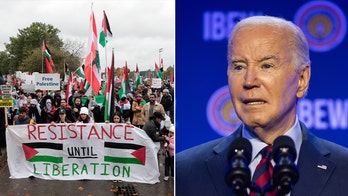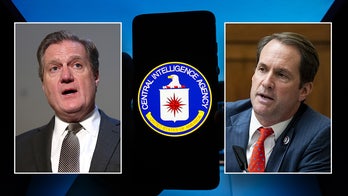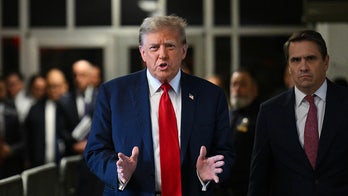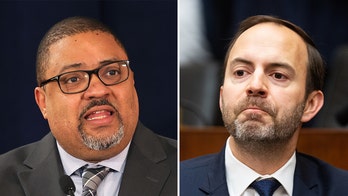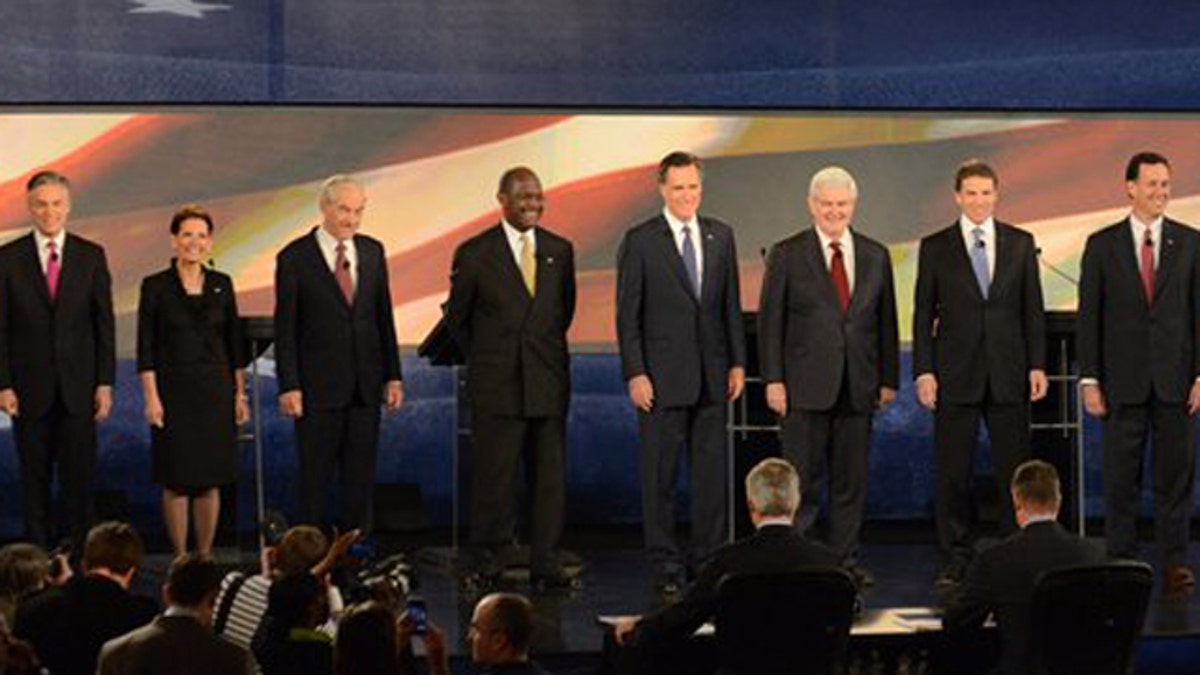
From left, Republican presidential candidates, Jon Huntsman, Former Governor of Utah, Michele Bachmann, U.S. Representative from Minnesota, Ron Paul, U.S. Representative from Texas, Herman Cain, Businessman, Mitt Romney, Former Governor of Massachusetts, Newt Gingrich, Former Speaker of House, Rick Perry, Texas Governor, and Rick Santorum, Former U.S. Senator, prepare to speak at the CBS News/National Journal foreign policy debate. (AP)
On everything from foreign aid to the Iranian nuclear threat, the Republican presidential candidates bared deep differences over their approach to foreign policy at a South Carolina debate which for an evening put the economy on the backburner.
The candidates staked out positions across the spectrum on the challenging issue of how to deploy America’s military and financial might around the world. They roundly accused President Obama of being too soft with America’s enemies, but on the question of how to effectively project American strength and protect the homeland were often at odds.
On Iran, the candidates quarreled over how to dissuade the regime in Tehran from carrying out alleged plans to develop a nuclear weapon.
Former House Speaker Newt Gingrich said that if all other steps failed, "you have to take whatever steps are necessary" to prevent that outcome. He said the approach should include covertly “taking out their scientists” and “breaking up their systems.”
Former Massachusetts Gov. Mitt Romney said Iran would obtain a nuclear weapon if Obama is reelected.
“And if you elect Mitt Romney, Iran will not have a nuclear weapon," he said.
But Texas Rep. Ron Paul dismissed the talk as the kind of “war propaganda” that led the U.S. into Iraq.
The candidates also diverged sharply over the issue of foreign aid – particularly to Pakistan.
Texas Gov. Rick Perry repeatedly said that in a Perry administration, foreign aid for all countries would “start at zero dollars.”
He said Pakistan is sending messages that “they don’t deserve our foreign aid.”
“It’s time for us as a country to say no to foreign aid to countries that don’t support the United States of America,” he said. “I don’t trust them.”
Gingrich hailed Perry’s idea as exceptional. “You ought start off with zero and say explain to me why I should give you a penny,” Gingrich said.
But Minnesota Rep. Michele Bachmann and former Pennsylvania Sen. Rick Santorum contended that the U.S. should be more careful with Pakistan considering they have nuclear weapons.
“Pakistan must be a friend of the United States,” Santorum said. “They must be our friend.”
Perry also used the debate to continue conducting damage control for his last debate performance in Michigan. At that debate, Perry was unable to remember all three of the Cabinet departments he wanted to eliminate -- which were Commerce, Education and Energy.
Lightening things up, Perry likened his proposal to start foreign aid at zero dollars to his approach to eliminating those departments.
“We ought to do that with some of those agencies I was trying to think the name of,” he joked.
The 90-minute debate devoted to defense and foreign policy brought eight would-be commanders in chief together on a debate stage for the second time in less than a week.
While Republicans were talking about foreign policy, Obama was engaged in high-level diplomacy. On the first stop of a nine-day Asian trip. He met in Hawaii with the leader of Russia and then was meeting with the president of China.
Obama said he and Russian President Dmitry Medvedev intend to "shape a common response" to new allegations Iran has been covertly trying to build a nuclear bomb.
On the debate stage at Wofford College, the war in Afghanistan produced the same response as the question in Iran's nuclear ambitions -- unanimous criticism of the president, but differences among the Republicans seeking to take his place.
Jon Huntsman, who served as Obama's first ambassador to China, said it was time to withdraw all U.S. troops from Afghanistan, a land where their boots first touched the soil a decade ago. "I say it's time to come home. I say this nation has achieved its key objectives," he said.
But Romney and Perry said they would side with military commanders on the ground about when to withdraw troops. They criticized Obama for "telegraphing" the nation's intentions.
Still, Romney said he supports a full withdrawal by the end of 2014.
"The timetable by the end of 2014 is the right timetable for us to be completely withdrawn from Afghanistan, other than a small footprint of support forces," Romney said.
Obama's would-be successors differed on waterboarding, as well, the interrogation technique that former President George W. Bush authorized and Obama has banned.
While Cain and Bachmann both said they would reinstate the technique, Huntsman said use of the procedure diminishes U.S. standing in the world and Paul said it is illegal.
Romney wasn't asked directly, but said he would "use whatever means necessary to protect America."
Perry said, "This is war. That's what happens in war. I'm for using the techniques, not torture, but using those techniques that we know will extract the information to save young Americans' lives -- and will be for it until I die."
The CBS/National Journal debate occurred less than two months before the formal selection of national convention delegates begins on Jan. 3 in the Iowa caucuses, and with the race remarkably jumbled.
Romney has been at or near the top of the public opinion polls for months, while a succession of rivals vying to emerge as his principal challenger has risen and fallen in turn.
The latest soundings show Cain the current leader in that sweepstakes, although Gingrich has risen significantly in national polls in recent weeks as Perry has fallen back.
The Associated Press contributed to this report.

